Texas Instruments Inc. reported a 34% decline in second-quarter profit and predicted soft third-quarter results, saying an uncertain economic climate is leading to caution among the chip maker’s customers and distributors.
┬Ā
Demand for semiconductors has been shaky in the past few quarters amid global economic worries and weaker consumer spending. TI, which makes chips used in everything from cellphones to industrial equipment, had been more bearish about market conditions than some others in the chip sector as it has suffered five straight quarters of declining profits and persistently soft demand.
While the company said recently that its business had bottomed and was beginning to grow, it again warned Monday that customers are wary about making purchases.
“Customers are cautious and keeping inventories lean,” Chief Financial Officer Kevin March said Monday in an interview.”What we need to keep reminding ourselves is we are seeing growth. We’re just not seeing growth as robustly as we might like to see at this point in the economic cycle.”
As a result, TI said it expects below-seasonal revenue growth for the third quarter, with sales about flat from the second period, based on the midpoint of the company’s outlook. Revenue typically rises about 6% sequentially, Mr. March said.
For the second quarter, TI reported results broadly in line with its expectations, with earnings coming in slightly better than its estimates.┬ĀShares, down 16% over the past three months through Monday’s close, were about flat at $26.80 after hours Monday.
Analysts and investors largely were expecting weak guidance from TI, said Northland Capital Markets analyst Mike Burton.
“That’s clearly the expectation for most [semiconductor] companies,” he said.”With TI playing into the communications equipment area as well as auto, where we have seen some weakness, expectations were definitely much lower than Street consensus indicated.”
Along with its exposure to automotive and communications-equipment companies, TI is a longtime supplier of chips to Nokia Corp. The chip maker’s sales have been hurt by the Finnish company’s struggles in the handset business, and it’s working to wind down its business selling wireless chips.
Mr. March said the business should total about $50 million in the third quarter, down from $90 million in the second. He expects the figure to be about zero heading into 2013.
TI is counting on last year’s purchase of National Semiconductor to help boost its results in the analog-chip market, providing chips that convert real-world signals to digital.┬ĀMr. March said TI’s daily new orders strengthened most of the quarter but started to weaken in June. They have remained around the same level in July, not picking up or slowing down.
He noted the company’s backlog coverage, or the orders scheduled to ship in a certain month, is about normal for July and August but is below normal for September. Mr. March said September’s lower backlog could be because customers are cautious and are trying to carry minimal levels of inventory, or it could be because the amount of time it takes to get chips from TI is short–about six to eight weeks.
“Customers just haven’t given us much visibility into their needs in September,” he said.
For the current quarter, the company expects revenue roughly even with the previous quarter at $3.21 billion to $3.47 billion, and sees earnings between 34 cents and 42 cents a share, including 7 cents a share in acquisition and restructuring charges. Analysts polled by Thomson Reuters expected a profit of 50 cents a share on revenue of $3.54 billion.
Mr. March said during a conference call that gross margins will likely be “a little bit better” in the third quarter than in the second. That’s partly due to a strong quarter for the company’s calculator business, which has strong margins.
If customer demand increases, said Chief Executive Rich Templeton, the company is prepared to support higher shipments.
TI reported a second-quarter profit of $446 million, or 38 cents a share, down from $672 million, or 56 cents a share, a year earlier. The latest quarter included 6 cents of per-share charges related to the acquisition of National Semiconductor.┬ĀRevenue fell 3.6% to $3.34 billion.
The company in June had forecast earnings of 32 cents to 36 cents a share with revenue between $3.28 billion and $3.42 billion.






















